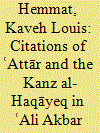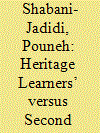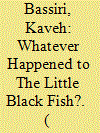|
|
|
Sort Order |
|
|
|
Items / Page
|
|
|
|
|
|
|
| Srl | Item |
| 1 |
ID:
161394


|
|
|
|
|
| Summary/Abstract |
ʿAli Akbar Khatāyi’s Khatāynāmeh (Book of China), a detailed description of state and society in Ming China written in 922/1516, includes citations from the Kanz al-Haqāyeq (attributed to Mahmud Shabestari) and ʿAttār’s Elāhināmeh. By citing these two texts at key points in his description of the Chinese government, Khatāyi articulates a radical political vision in which the civil officials, rather than the emperor, are the true rulers. Furthermore, by using the Kanz al-Haqāyeq as a portal text, and through frequent citations of other gnostic poetry, he crafts his own authorial presence by identifying his own text with fotovvat and gnosticism, and invokes a conceptual framework based on the thought of Ibn ʿArabi epitomized in his intertexts.
|
|
|
|
|
|
|
|
|
|
|
|
|
|
|
|
| 2 |
ID:
161397


|
|
|
|
|
| Summary/Abstract |
This paper examines the acquisition particularities of advanced-level students. It also investigates the use of content-based—in this case media material—in teaching advanced-level students, as well as the impact of teaching such material on the students’ writing ability and overall proficiency. Finally, the subtle differences between heritage learners and second language learners are analyzed and discussed. Therefore, this research encompasses both a quantitative and a qualitative study of the issue at stake to ensure reliability of the findings. The results of the study suggest that there is no significant difference between the number of errors made by heritage learners and second language learners; however, the sources of these errors are often different. These sources of error and their possible reasons are discussed in this paper.
|
|
|
|
|
|
|
|
|
|
|
|
|
|
|
|
| 3 |
ID:
161396


|
|
|
|
|
| Summary/Abstract |
Beyond the esoteric deliberations of Islamic jurists and their exegesis of criminal and private law doctrines, Iranian law lives a life of its own. It is a life of routine practices of judges, court clerks, lawyers and clients, each of whom is striving to turn the law to their own advantage. It is also a life of contested legality, a relentless struggle over the right to determine the law in a juridical field which is infused with strife and hostility. These conflicts are reproduced daily as two competing conceptions of law, and their corresponding perceptions of legality clash in pursuit of justice. The Iranian judiciary’s concept of law, its reconstruction of Islamic jurisprudence and methods of dispensing justice, which on the surface are reminiscent of Max Weber’s “qādi-justice,” collide with the legal profession’s formal rational understanding thereof. However, Iranian judges are not Weberian qādis, and the legal profession is not a homogenous group of attorneys driven by a collective commitment to the rule of law. To understand their conflict, we need to explore the mundane workings of the legal system in the context of the transformation of Iranian society and the unresolved disputes over the direction of its modernity.
|
|
|
|
|
|
|
|
|
|
|
|
|
|
|
|
| 4 |
ID:
161395


|
|
|
|
|
| Summary/Abstract |
This essay uses retranslation studies to trace the defanging and domestication of Samad Behrangi’s The Little Black Fish, a children’s story once hailed as a major revolutionary and literary text. Behrangi’s book is the only modern Iranian prose work to have been translated multiple times both before and after the Islamic Revolution of 1979. The study compares the texts from several of these retranslations, by considering whether they have been domesticated for their English readers, as well as their context, by looking at the cultural impact of such factors as the Islamic Revolution and US‒Iran relations. It looks at how various translators and publishers have interpreted the story and how their perspectives reflect Iranian history, the influence of Middle East studies, and the interests of the Iranian diaspora. The result sheds light on translation norms, as well as on the circulation and interpretation of Iranian literature in the global context.
|
|
|
|
|
|
|
|
|
|
|
|
|
|
|
|
|
|
|
|
|